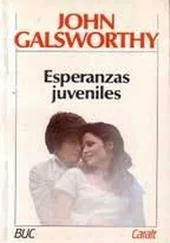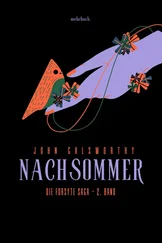John Galsworthy - Flowering Wilderness
Здесь есть возможность читать онлайн «John Galsworthy - Flowering Wilderness» весь текст электронной книги совершенно бесплатно (целиком полную версию без сокращений). В некоторых случаях можно слушать аудио, скачать через торрент в формате fb2 и присутствует краткое содержание. Жанр: Классическая проза, на английском языке. Описание произведения, (предисловие) а так же отзывы посетителей доступны на портале библиотеки ЛибКат.
- Название:Flowering Wilderness
- Автор:
- Жанр:
- Год:неизвестен
- ISBN:нет данных
- Рейтинг книги:3 / 5. Голосов: 1
-
Избранное:Добавить в избранное
- Отзывы:
-
Ваша оценка:
- 60
- 1
- 2
- 3
- 4
- 5
Flowering Wilderness: краткое содержание, описание и аннотация
Предлагаем к чтению аннотацию, описание, краткое содержание или предисловие (зависит от того, что написал сам автор книги «Flowering Wilderness»). Если вы не нашли необходимую информацию о книге — напишите в комментариях, мы постараемся отыскать её.
Flowering Wilderness — читать онлайн бесплатно полную книгу (весь текст) целиком
Ниже представлен текст книги, разбитый по страницам. Система сохранения места последней прочитанной страницы, позволяет с удобством читать онлайн бесплатно книгу «Flowering Wilderness», без необходимости каждый раз заново искать на чём Вы остановились. Поставьте закладку, и сможете в любой момент перейти на страницу, на которой закончили чтение.
Интервал:
Закладка:
Wilfrid’s words: “You can tell her family I’m going away,” and Dinny’s: “It’s finished,” had travelled, if not like wildfire, throughout the Cherrell family. There was no rejoicing as over a sinner that repenteth. All were too sorry for her, with a sorrow nigh unto dismay. Each wanted to show sympathy, none knew how. Sympathy smelling of sympathy was worse than none. Three days passed, during which not one member of the family succeeded in expressing anything. Then Adrian had a brainwave: He would ask her to eat something with him, though why food should be regarded as consolatory neither he nor anyone else had ever known. He appointed a café which had perhaps more repute than merit.
Since Dinny was not of those young women who make the ravages of life into an excuse for French-varnishing their surfaces, he had every opportunity to note her pallor. He forbore to comment. Indeed, he found it difficult to talk at all, for he knew that, though men, when enthralled by women, remain devoted to their mental mainsprings, women, less bodily enthralled, stay mentally wrapped up in the men they love. He began, however, to tell her how someone had tried to ‘sell him a pup.’
“He wanted five hundred pounds, Dinny, for a Cromagnon skull found in Suffolk. The whole thing looked extraordinarily genuine. But I happened to see the county archaeologist. ‘Oh!’ he said: ‘So he’s been trying to palm that off on you, has he? That’s the well-known “pup.” He’s dug it up at least three times. The man ought to be in gaol. He keeps it in a cupboard and every five or six years digs a hole, puts it in, takes it out, and tries to sell it. It possibly IS a Cromagnon skull, but he picked it up in France, about twenty years ago. It would be unique, of course as a British product.’ Thereon I went off to have another look at where it was found last time. And it was plain enough, when you already knew it, that he’d put the thing in. There’s something about antiques that saps what the Americans call one’s MORAL.”
“What sort of man was he, uncle?”
“An enthusiastic-looking chap, rather like my hairdresser.”
Dinny laughed. “You ought to do something, or he WILL sell it next time.”
“The depression is against him, my dear. Bones and first editions are extraordinarily sensitive. He’ll have to live a good ten years to get anything like a price.”
“Do many people try to palm things off on you?”
“Some succeed, Dinny. I regret that ‘pup,’ though; it was a lovely skull. There aren’t many as good nowadays.”
“We English certainly are getting uglier.”
“Don’t you believe it. Put the people we meet in drawing-rooms and shops into cassocks and cowls, armour and jerkins, and you’ll have just the faces of the fourteenth and fifteenth centuries.”
“But we do despise beauty, Uncle. We connect it with softness and immorality.”
“Well, it makes people happy to despise what they haven’t got. We’re only about the third—no, the fourth—plainest people in Europe. But take away the Celtic infusions, and I admit we’d be the first.”
Dinny looked round the café. Her survey added nothing to her conclusions, partly because she took but little in, and partly because the lunchers were nearly all Jews or Americans.
Adrian watched her with an ache. She looked so bone-listless.
“Hubert’s gone, then?” he said.
“Yes.”
“And what are you going to do, my dear?”
Dinny sat looking at her plate. Suddenly she raised her head and said:
“I think I shall go abroad, Uncle.”
Adrian’s hand went to his goatee.
“I see,” he said, at last. “Money?”
“I have enough.”
“Where?”
“Anywhere.”
“By yourself?”
Dinny nodded.
“The drawback to going away,” murmured Adrian, “is the having to come back.”
“There doesn’t seem to be anything much for me to do just now. So I think I’ll cheer people up by not seeing them for a bit.”
Adrian debated within himself.
“Well, my dear, only you can decide what’s best for you. But if you felt like a long travel, it strikes me that Clare might be glad to see you in Ceylon.”
Seeing by the surprised movement of her hands that the idea was new to her, he went on:
“I have a feeling that she may not be finding life very easy.”
Her eyes met his.
“That’s what I thought at the wedding, Uncle; I didn’t like his face.”
“You have a special gift for helping others, Dinny; and whatever’s wrong about Christianity, it’s not the saying ‘To give is more blessed than to receive.’”
“Even the Son of Man liked His little joke, Uncle.”
Adrian looked at her hard, and said:
“Well, if you do go to Ceylon, mind you eat your mangoes over a basin.”
He parted from her a little later and, too much out of mood to go back to work, went to the Horse Show instead.
CHAPTER 32
At South Square The Daily Phase was among those journals which politicians take lest they should miss reading correctly the temperature of Fleet Street. Michael pushed it over to Fleur at breakfast.
During the six days since Dinny’s arrival neither of them had said a word to her on the subject of Wilfrid; and it was Dinny who now said: “May I see that?”
Fleur handed her the paper. She read, gave a little shudder, and went on with her breakfast. Kit broke the ensuing hush by stating Hobbs’ average. Did Aunt Dinny think he was as great as W. G. Grace?
“I never saw either of them, Kit.”
“Didn’t you see W. G.?”
“I think he died before I was born.”
Kit scrutinised her doubtfully.
“Oh!”
“He died in 1915,” said Michael: “You’d have been eleven.”
“But haven’t you really seen Hobbs, Auntie?”
“No.”
“I’VE seen him three times. I’m practising his hook to leg. The Daily Phase says Bradman is the best batsman in the world now. Do you think he’s better than Hobbs?”
“Better news than Hobbs.”
Kit stared.
“What is ‘news’?”
“What newspapers are for.”
“Do they make it up?”
“Not always.”
“What news were you reading just now?”
“Nothing that would interest you.”
“How do you know?”
“Kit, don’t worry!” said Fleur.
“May I have an egg?”
“Yes.”
The hush began again, till Kit stopped his eggspoon in midair and isolated a finger:
“Look! The nail’s blacker than it was yesterday. Will it come off, Auntie?”
“How did you do that?”
“Pinched it in a drawer. I didn’t cry.”
“Don’t boast, Kit.”
Kit gave his mother a clear upward look and resumed his egg.
Half an hour later, when Michael was just settling down to his correspondence, Dinny came into his study.
“Busy, Michael?”
“No, my dear.”
“That paper! Why can’t they leave him alone?”
“You see The Leopard is selling like hot cakes. Dinny, how do things stand now?”
“I know he’s been having malaria, but I don’t even know where or how he is.”
Michael looked at her face, masked in its desperate little smile, and said, hesitatingly:
“Would you like me to find out?”
“If he wants me, he knows where I am.”
“I’ll see Compson Grice. I’m not lucky with Wilfrid himself.”
When she was gone he sat staring at the letters he had not begun to answer, half dismayed, half angered. Poor dear Dinny! What a shame! Pushing the letters aside, he went out.
Compson Grice’s office was near Covent Garden, which, for some reason still to be discovered, attracts literature. When Michael reached it, about noon, that young publisher was sitting in the only well-furnished room in the building, with a newspaper cutting in his hand and a smile on his lips. He rose and said: “Hallo, Mont! Seen this in The Phase?”
Читать дальшеИнтервал:
Закладка:
Похожие книги на «Flowering Wilderness»
Представляем Вашему вниманию похожие книги на «Flowering Wilderness» списком для выбора. Мы отобрали схожую по названию и смыслу литературу в надежде предоставить читателям больше вариантов отыскать новые, интересные, ещё непрочитанные произведения.
Обсуждение, отзывы о книге «Flowering Wilderness» и просто собственные мнения читателей. Оставьте ваши комментарии, напишите, что Вы думаете о произведении, его смысле или главных героях. Укажите что конкретно понравилось, а что нет, и почему Вы так считаете.












